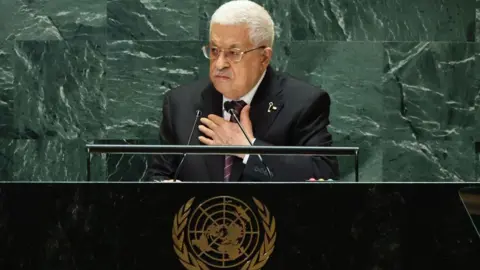Palestinian President Mahmoud Abbas has been blocked from attending the UN General Assembly session in New York next month, after he and 80 other Palestinian officials had their visas revoked, the US State Department has said.
US Secretary of State Marco Rubio blamed them for undermining peace efforts and for seeking the unilateral recognition of a conjectural Palestinian state.
The decision, welcomed by Israel, is unusual as the US is expected to facilitate travel for officials of all countries wishing to visit the UN headquarters.
The ban comes as France leads international efforts to recognise a state of Palestine at the session - a move Donald Trump's administration has opposed.
The Palestinian ambassador to the UN, Riyad Mansour, had earlier stated that Abbas, as head of its delegation, would attend the meeting of heads of state and government. However, a State Department official later stated that Abbas and about 80 other Palestinians would be affected by the decision to deny and revoke visas from members of the Palestine Liberation Organization (PLO) and the Palestinian Authority (PA).
Rubio asserted that Palestinian representatives at the UN mission in New York could attend the meetings, in line with the UN Headquarters Agreement, which regulates operational matters of the UN in the US.
However, the compliance of the US move with the agreement remains unclear, as it states that attendance by foreign officials in New York should not be impeded by the US, irrespective of the relations between those governments and the US.
Abbas' office expressed astonishment at the visa decision, which it claimed contradicts international law and the UN Headquarters Agreement, urging the U.S. to reverse the move.
Israel’s Foreign Minister Gideon Saar welcomed the decision. Hamas has been governing the Gaza Strip for years, while Abbas' Fatah party controls the West Bank, yet the Palestinian Authority faces challenges in governance amid expansion of Jewish settlements.
In 1974, the UN recognized the PLO as the sole legitimate representative of the Palestinian people, and granted it observer status at the UN General Assembly. In 2012, the General Assembly upgraded its status to a non-member permanent observer state.
Israeli Prime Minister Benjamin Netanyahu has often rejected the two-state solution, the international formula for resolving the Israel-Palestine conflict, arguing that recognition of a Palestinian state would reward terrorism.
Since the military campaign launched by Israel in response to the October 7th Hamas-led attack, the humanitarian crisis in Gaza has escalated, with more than 63,000 people reported killed, as cited by the Hamas-run health ministry.










